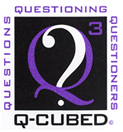"Ignorance represents all that we have yet to learn and discover - from an individual or collective viewpoint and shifting over time. You cannot learn what you already 'know' - although you may have to unlearn some things, and you cannot discover something you've already found - although you may occasionally rediscover something you've misplaced or forgotten. Also, ignorance - i.e., unanswered questions - is the raw material of knowledge, and (current) knowledge is the raw material of (future) ignorance, i.e., answers and questions shift with time and the accumulation of answers. That is why, some years ago, philosopher-in-residence Ann Kerwin, PhD, and I developed the Ignorance Map (below) to define these shifting domains of ignorance."
-- Marlys Witte, MD
University of Arizona
Professor of Surgery
"Ignorance is the kind of not knowing that comes from insight and leads to insight. That insight -- the one it comes from and the one it leads to -- is the discovery that there is a world far larger than the one that is known, one that (whether we know it or not) shapes all our knowns. It is a world we know nothing about, though if we search we can catch glimpses of it. Ignorance is the not knowing that opens us up to philosophical wonder, to scientific discovery, to human wisdom."
-- Gerald Nosich, PhD
University of New Orleans
Professor of Philosophy
"Ignorance is excitement,
the perpetual challenge to grow.
Ignorance is everything yet to be:
places you've yet to go;
people you've yet to meet;
facts you've yet to learn;
things you've yet to discover.
Ignorance is viewing the world
through the eyes of a child for whom
all is fresh, new and unexpected.
Ignorance is the possibility of surprise."
-- Bob Root-Bernstein, PhD
Michigan State University
Professor of Physiology
1. I have no idea!
2. If I knew the answer, I wouldn't be so dumb!
3. Not knowin' nuttin'
4. Thinking you know everything
5. Refusing to learn from experience, from failure, from mistakes, from others, from anything.
6. Arrogance and stubbornness
7. Intellectual bigotry
-- Dennis Rohatyn, PhD
University of San Diego
Professor of Philosophy
"A simple definition is 'not knowing.' An operational definition is the stimulus to learn if the answer is known or the stimulus to investigate if the answer is not as yet known. In short, ignorance is operationally intertwined and indivisible from knowledge as the latter stimulates questions about the unknown, whereas enlightened ignorance or unknowing stimulates a quest for knowledge."
-- Charles Witte, MD
University of Arizona
Professor of Surgery

